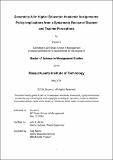| dc.description.abstract | This study systematically investigates students’ and teachers’ perceptions of using Generative AI in higher education assignments. Through a comprehensive systematic review of 37 papers, the study identifies common perspectives, differences, major ethical concerns, and the need for policy development and regulation. The systematic review reveals the potential benefits of AI tools, including improved efficiency and personalized learning experiences. However, it also highlights significant challenges and ethical concerns, such as the risk of academic dishonesty, over-reliance on technology, and the need for transparency in data processing and privacy.
Additionally, a policy review is conducted to assess the extent to which policies at international, national, and institutional levels address the major ethical concerns identified in the systematic review. The study finds notable gaps between the significant ethical concerns perceived by students and teachers and the existing rules and guidance available. The UNESCO guidance provides valuable recommendations, but national and institutional policies need further development to effectively address the unique challenges posed by AI in educational settings.
The study underscores the importance of collaboration, capacity building, and ongoing evaluation in navigating the challenges of integrating Generative AI in higher education. Policymakers and educational institutions should prioritize providing training and support for educators, fostering a culture of academic integrity, and promoting the development of AI literacy skills. Future research should address the limitations identified in this review, such as conducting studies with larger, more diverse samples and employing longitudinal designs. | |
